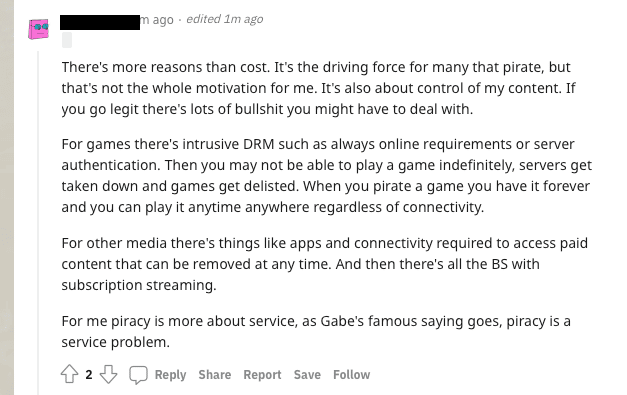
I've long been critical of weak predictions for the upcoming year. I mean, how often can you get to the point where we say that it's not a prediction to say that there's going to be "more data than ever before?"
I love bold predictions. I actually especially love the predictions that were hilariously, objectively wrong. Just 3 years ago the predictions that were the most entertaining still bring some provoking thought (Nutanix buying Snowflake? Awesome.)
The 'best' predictions are often the ones that are the most boring. Why? Because they came true. Correct predictions that are bold are often indistinguishable from weak predictions that were truly inevitable. (I still applaud Chad Meley of Teradata for accurately predicting the Cloud providers moving to full stack offerings. In 2019, that wasn't a given.)
So, in light of that, I'm going to stick my neck out and make my own predictions. Right or wrong, at least it won't be cliché and boring.
I think towards the end of 2023 we'll see a strong shift towards Blockchain and NFTs driving behind-the-scenes consumer interactions, particularly in gaming, rewards programs, and even currency of value.
Bear with me, and I'll even explain why this seems like a cogent path. Of course, even if I'm wrong, we'll be able to entertain ourselves in the future.
Go bold or go home, right?

First things first. I'm not a 'fan' of blockchain, and I'm certainly not a 'fan' of NFTs.
As a matter of fact, this is less a matter of promoting the halcyon future of perfect technology, and more a caveat of taking the bad with the good.
To me, these have been problems searching for a solution, with a massive amount of misunderstanding and miscommunication surrounding the issue. It's this very environment that allowed the likes of Sam Bankman-Fried and Avraham Eisenberg to thrive.
That is not a fault of the technology, however. There is a need for a solution to being able to validate data - it just isn't going to be a quick fix by selling Ponzi schemes and socially manipulating uneducated users out of their money.
Quick Background
I'm not going to go into the technical details of Blockchain or NFTs. I'm also not going to talk about Cryptocurrency, because I find those who zero in on the fintech aspect of the technology completely miss the bigger picture.
Instead, I'm going to gloss over the mechanics to discuss why they are useful (and, possibly dangerous - but more on that below). If you want to know the basics about how blockchain works, I found this primer to be excellent as a starting point:
NFTs, or Non-Fungible Tokens, are often confusing because people use it incorrectly. There is no shortage of videos on "how to make money with NFTs" selling your crappy artwork, but very little on the actual technology and how it works.
Instead, I recommend that you read this document if you really want to know more about NFTs (aka ERC-721).
In a nutshell, the important part of this discussion is the "T" part - Token. NFTs as known today are an Ethereum construct, but valid tokenization of data can come in different forms.
It may be a bit difficult to remove yourself from the idea that a "NFT" is some piece of 8-bit character art or the 'passion' project of a former president, because it's a lot easier to think about technology if you can visualize it.
In order to keep things very simple, though, think of it this way: it's a way to ensure that something that says it is can be validated to be what it is. It is a certificate of authenticity, so to speak.
Because the token is non-fungible and can not be changed (more on this below), it now has a value in its uniqueness. Well, to put it more specifically, whatever the item is that can be validated to be what it says it is, has value because you can guarantee that uniqueness.
How do you guarantee that the token is valid? That's what the blockchain foundation gives you: a strict validation that that token is, itself, what it claims to be. Then the mining nodes will come to a consensus based upon those validated blocks.
So, because the token is unique and validated, you can exchange it if someone else finds value in that item's uniqueness. What's more, the exchange (e.g., contract for the exchange) can be validated as unique and having value as well. And so on.
The Good
Since we're talking about the key aspect of this technology is that "it is what it says it is," it has profound implications in industries that have a vested interest in authentication.
Like licensing.
What might this look like? Let's take gaming as an example.
Right now, one of the big downsides (from a user perspective) to video games is the inability to resell games that you don't want or play any more. Back when physical disks were the key means to trade, it was easy. Not so much with digital versions.
Because software is really easy to copy and distribute, one of its greatest strengths has also been one of its greatest weaknesses. As it turns out, being able to control access to software has been a problem since the very first personal computer.
Digital versions come with profound risk to the publishers and developers as piracy is a multi-billion-dollar problem. It's so bad that developers have come up with pretty creative ways to punish thieves, but has the unfortunate side effect of often penalizing legitimate users as well.

DRM (Digital Rights Management) is a lynchpin in the downward spiral of the adversarial nature of consumers versus developers.
For instance, consumers don't want to pay for content they think is "crappy," so developers put in revenue-generating elements (e.g., "loot boxes") to make up for the lost revenue, which annoys gamers and drives them to cheat and pirate more, which in turn leads developers to "make up" for lost revenue, and so on.
Once you tokenize the game - that is, once you effectively create the game as its own NFT - then you can start doing reselling in a legitimate way. You have something tangible, something that is indeed unique and guaranteed to be unique.
Why would developers and publishers want to do this? Because you now also have the ability to tokenize the contract, and can build in a resell value to them as well. Say, for instance, Steam and a game developer get 5% (making the number up here) for every resold game. It encourages them to build in tokenized versions of their games for an additional revenue stream that they don't currently have.
Why would consumers want this? Because you don't just have to tokenize the game; you can tokenize individual assets in the game itself!
Imagine, if you will, the ability to play a game, built up a character or a weapon or a suit of armor to the max ability - and then sell it. There are people (I'm not one of them, but they definitely do exist) who would happily pay for a built-out character or Plus-gazillion supersword for their favorite game.
Get paid to play games? Hmmm... maybe I need to rethink my career path!
Another example is customer rewards and loyalty programs. Keeping with the gaming theme (but obviously it has implications elsewhere), suppose you have the ability to tie in your character's behavior with the hardware that you use.
For instance, let's say I'm a gamer who likes photo-realistic environments and max out my GPU card so that I can get the most immersive, realistic experience I can. In Steam, you already have the ability to get "collector cards," but what if there was true value associated with those types of things? What if I could trade in those cards that I receive in-game for actual, real, tangible items that can help improve that gaming experience because I was gaming that way?
This is just one example, albeit a big one. The implications for the entire entertainment industry should be pretty obvious right now, so you get the idea with that, but there are many, many other possibilities beyond entertainment.
The Bad
NFTs (and the Blockchain underpinnings) are only as useful as the ability to validate their uniquness and authenticity.
Most people, however, have heard that blockchain data is immutable and impossible to change, and so they assume that this is the case. The trouble is that it's not the data that is critical here, it's the validation of that data.
The validation of data gets stronger when you have lots and lots of confirmations that the data is accurate. If you have a consensus that the data is valid from a million different sources, it's far more reliable to be considered valid than if you have four.
This is what's happening right now. Blockchain validation is, ultimately, a very expensive and resource-consuming task. What's more, validation is different depending upon what type of system you're talking about (i.e., Ethereum validators don't work on Bitcoin validations, or vice-versa).
This means, ultimately, that there are fewer and fewer validators for the blockchains as those same chains grow. It is conceivable that the "non-fungible" tokens are built on effectively non-democratized blockchain validations.
In case it's not obvious, that would be bad. Very bad.
One of the reasons why this is a very real possibility is because of the sheer power requirements needed to operate that technology. It's so bad that some countries - namely China - started implementing bans on cryptocurrency mining in 2021.
(Remember, mining and validation are not the same thing.)
There must always be a good balance between the validation nodes and the consensus nodes. After all, consensus involves agreeing on the ordering of validated transactions. So, validation precedes the consensus.
What happens when there are too few validators?
The best-case scenario is that there is a backlog of validated blocks. The worst-case scenario is that blocks are not "properly" validated. You need decentralization for all of this, but there is a growing consolidation among validators.
In layman's terms, consolidation of these validation "providers" is not a good thing.
The Very, Very Ugly
This becomes particularly evident when we start talking about a "Universal Wallet."
Up until this point in time we've purposefully avoided talking about cryptocurrencies, because it's too easy to get sidetracked in the conversation. Here, though, we have to skirt the edges of that conversation in order to get to the crux of the issue.
In order for any of this to work, there has to be some form of a marketplace where the value can be negotiated. That value, in turn, needs to be something tangible that can be used by a consumer (as well as the vendors).
Personally, I avoid centralized wallets (ApplePay, Google Pay, etc.) like the plague. All you need to do is look at the Paypal fiasco.
In case you didn't know, Paypal said the quiet part out loud. They explicitly stated in their terms and conditions that if they didn't like something you said on social media (or anywhere, for that matter), they would fine you $2,500). After the PR hit, they backtracked, but not for long.
Regardless of what happens with Paypal in the future, the writing on the wall is extremely clear: whether it be Paypal or Chase or Bank of America or Wells Fargo or any other institution that makes decisions based upon political motivation, the point is clear. It is not a good idea to reduce choice for people controlling their own finances.
(And yes, I understand that many of the examples in the paragraph above are politically charged. My point here is that granting such power to people who may not like you based upon what you say or think is not a wise fiscal policy.)
The question then becomes, though, if this is the direction that "Big Tech" and "FinTech" will go, what can the individual do to protect himself? Given international governments' willingness to conspire with tech giants to control information and coerce behavior, what is the poor Joe and Jane Shmoe supposed to do?
The Prediction Conclusion
Well, there you have it.
Something to think about, at least; a prediction about 2023 that isn't just "more data means more data management troubles."
Do you agree? Disagree? Think that I'm way out on a limb? I'd love to hear your thoughts.


Comments
The problem with decentralized consensus based on Proof of Work is that it doesn’t stay decentralized for very long. Four miners control 63% of BTC validation and only 2 controlled the majority of ETH before it moved to Proof of Stake https://medium.com/hackernoon/guess-what-bitcoin-isnt-decentralized-ecab67de653d
Proof of Work is labor intensive and subject to the same laws of “economics of scale” that have historically eliminated private gold miners within 3 years of every gold rush, and most family farmers – even with large government subsidies. As the need for validation grows, those who can afford the capital to scale squeeze out those that can’t operate on a reduced profit margin.
Proof of Stake is inherently capital intensive and also inherently limiting in decentralization – but even faster than Proof of Work.
If you want freedom with your finances, avoid going digital.
Excellent points. Thanks for those links!